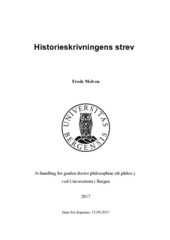Historieskrivningens strev
Doctoral thesis

Åpne
Permanent lenke
https://hdl.handle.net/1956/16853Utgivelsesdato
2017-09-15Metadata
Vis full innførselSamlinger
- Department of Philosophy [240]
Sammendrag
The focal question of this thesis is how the historian tries to resolve the tension built into the writing of history. The perspective on a tension existing in history texts stems from a broader understanding of the writing of history as consisting of more than problem, method, hypotheses and theories. The thesis will show the limited value these have in writing. The process of writing is abstractive, while the historian’s material pulls in the opposite direction; towards a description of the concrete. Therefore, historians are trying to resolve a built in tension between language and material. This analysis will bring to light characteristics of the historians’ works that are independent of the era in which they were created, instead focusing on what happens in the context of writing. The empirical material creates friction when confronted with existing perceptions or theories. Historical writing can arise from, or be affected by, prevailing views and theories, but will always be transformed during the textual process, where they will function as ways and means in the struggle with the ‘unresolving tension’ in the material. “Views of history” or “philosophies of history” may be used for categorising historical writing in retrospect, but the reach of such conceptions are limited if you want to understand the nature of historical writing. My perspective does not rule out that features of history texts can be read as mirrors or results of their time, their author, or other contexts. However, they do not solely reflect their time or their subject, but also that the writing itself is a context which may be investigated. Thus, theoretical and epochal categorisations such as classical, medieval, renaissance, historicist, etc., are of limited value when we want to understand the writing of history. The thesis discusses Hayden White’s influential approach to historical writing. In Metahistory. The Historical Imagination in Nineteenth-century Europe (1973), his focal point is that a historian does not find, but creates, history. However, the dichotomy between “finding” and “creating” is too simple to encompass the complex movement of what really takes place in the writing process. White's approach arises from a reading of works in philosophy of history but historians are committed to concrete historical material in a completely different way. White’s approach does not address the work that the historian performs upon the material. Connecting elements in the empirical material is the most difficult task of the historian. First and foremost he or she will look for causal connections. Causality in itself does not however produce a unity of meaning in the work. This produces dilemmas which I discuss in the light of an essay by Frank Ankersmit. The “unresolving tension” is a perspective taken from and inspired by Allan Megill, connected to an understanding of history as description. The thesis in addition makes use of insights from theorists like Walter Ong, Eric Havelock, Philippe Carrard, Michel de Certeau, Hennig Trüper and Anders Johansen, and attempts to further categorise “empirically informed writing”. The problems and perspectives are illuminated and discussed by reading a number of historical texts: Ludvig Holberg’s The Danish Empire's History (1732-35), two national histories by P.A. Munch (published 1851-1863) and Ernst Sars (published 1873-1891) and one on Norway in medieval times by Sverre Bagge (1998).
Beskrivelse
Avhandling for grad doctor philosophiae